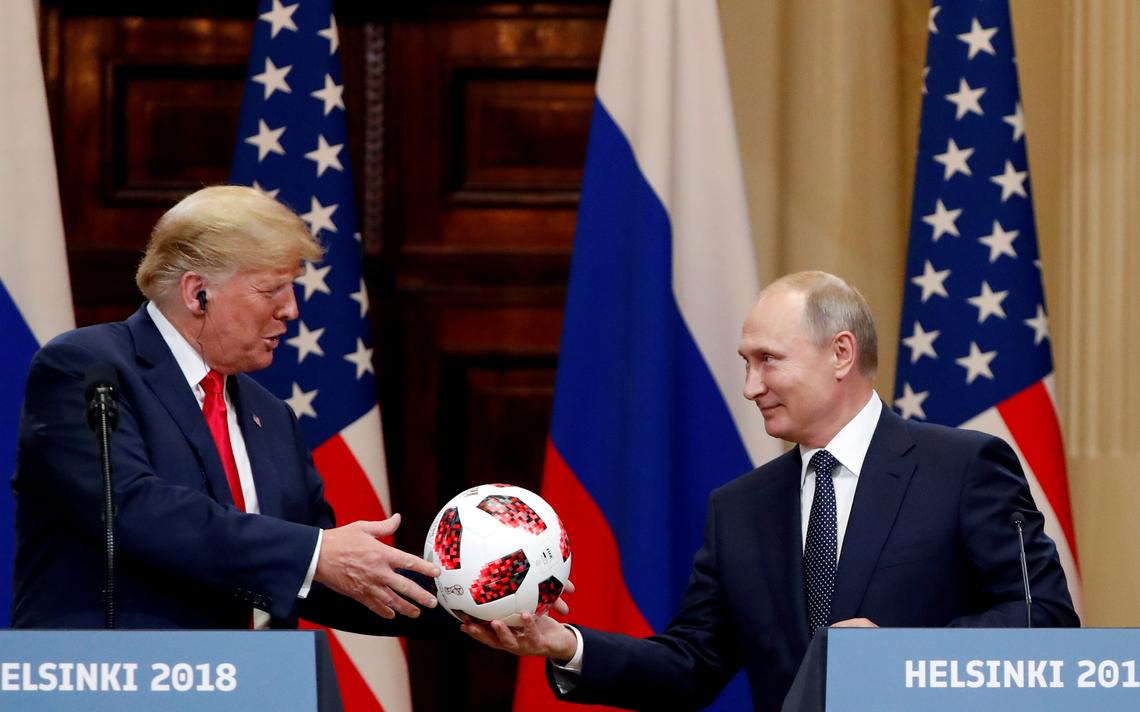WASHINGTON, (Reuters) – Russian President Vladimir Putin likely directed an effort by Moscow to try to swing the 2020 U.S. presidential election to Donald Trump, according to an American intelligence report released today that linked the Kremlin and allies of the former president.
The 15-page report, released by the Office of the Director of National Intelligence, added heft to longstanding allegations that some of Trump’s top lieutenants were playing into Moscow’s hands by amplifying claims made against then-candidate Joe Biden by Russian-linked Ukrainian figures in the run-up to the Nov. 3 election. It also added new findings that Putin either oversaw or at least approved of the election meddling to benefit Trump.
The findings about Putin’s role are likely to receive particular attention given the report’s conclusions that Russia-backed figures such as Ukrainian parliamentarian Andriy Derkach enlisted unnamed U.S. political figures in their campaign to smear Biden and his son Hunter.
The report named Derkach, who met with Trump’s lawyer Rudy Giuliani in 2019, as someone whose movements were being tracked, if not directed, by Putin.
“Putin had purview over the activities of Andriy Derkach,” the report said. “Other senior officials also participated in Russia’s election influence efforts – including senior national security and intelligence officials who we assess would not act without receiving at least Putin’s tacit approval.”
Biden, a Democrat, defeated Trump, a Republican, and became president in January.
U.S. intelligence agencies and former Special Counsel Robert Mueller previously concluded that Russia also interfered in the 2016 U.S. election to boost Trump’s candidacy with a campaign of propaganda aimed at harming his Democratic opponent Hillary Clinton.
Mueller found extensive contacts between Trump’s campaign and Russia. Trump while president also faced questions about ties by his associates with Russia and Russia-linked figures in Ukraine. The U.S. House of Representatives impeached Trump in 2019 – the first of two times – on charges arising from his request that Ukraine investigate the Bidens.
The U.S. intelligence report also found other foreign attempts to sway American voters in 2020 including a “multi-pronged covert influence campaign” by Iran intended to undercut Trump. As president, Trump pulled the United States out of an international nuclear deal with Iran and imposed fresh sanctions.
CHINA COUNTER-NARRATIVE
The report also punctured a counter-narrative pushed by Trump’s allies that China was interfering on Biden’s behalf, concluding that Beijing “did not deploy interference efforts.”
“China sought stability in its relationship with the United States and did not view either election outcome as being advantageous enough for China to risk blowback if caught,” the report said.
U.S. officials said they also saw efforts by Cuba, Venezuela and the Lebanese militant group Hezbollah to influence the election, although “in general, we assess that they were smaller in scale than those conducted by Russia and Iran.”
The Russian, Chinese and Cuban Embassies in Washington did not immediately return messages seeking comment. The Iranian mission to the United Nations and the Venezuelan Ministry of Information also did not immediately respond to requests for comment. Moscow, Beijing and Tehran routinely deny allegations of cyberespionage and election interference.
The report assessed that Russian leaders “preferred that former President Trump win re-election despite perceiving some of his administration’s policies as anti-Russia,” with its authors adding, “We have high confidence in this assessment.”
A key role was also played by another man with Russian intelligence ties, Konstantin Kilimnik, according to the report. It said Kilimnik and Derkach met with and gave materials to Trump-linked people to push for formal investigations, and Derkach released four audio recordings to try to suggest that Biden had tried to protect his son Hunter from a corruption probe in Ukraine. Giuliani was among those promoting such claims.
Kilimnik was an associate of Paul Manafort, who served as Trump’s 2016 campaign chairman. Trump last year pardoned Manafort for a criminal conviction that stemmed from Mueller’s investigation.
Russian agents also tried to hack subsidiaries of the Ukrainian energy company Burisma, “likely in an attempt to gather information related to President Biden’s family,” it said. Hunter Biden had served on Burisma’s board.
As in the 2016 election, the Russian so-called troll factory formerly known as the Internet Research Agency pushed disparaging stories on social media about Biden and Democrats and complained about censorship by the tech companies, the report said. It also sought to exacerbate U.S. divisions on racial justice issues, the report said.










